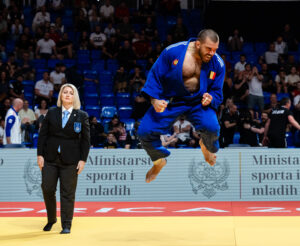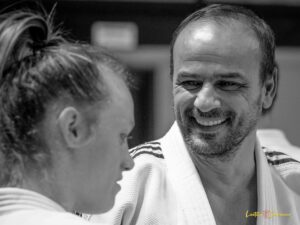A family trip back to Slovenia, to the legendary Marjan Fabjan’s Judo Klub Z’Dezele Sankaku in Celje. – JudoAKD#004.
A French version of this article is available here.
Nine years have passed. Nine years since this April 2015 report, made just one week after returning from a trip to Scotland. Lost luggage on a stopover in Brussels, a warm welcome as rarely seen. Strange impression of having known this place forever. Powerful encounters, powerful report. Wanted to come back ever since, furthermore with our discussions every winter on the same bench in a corner of the huge sports hall at Bardonecchia, Italy.
In this quasi-programmatic spring, when Oppenheimer triumphs at the Oscars and where the TV news opens more with people wearing military fatigues than three-piece suits, here we are with the kids on a road trip to Celje. Putting ourselves at risk. In discomfort. To see. To feel. To listen. To understand, perhaps. A few kilometers in France, a night with friends near Switzerland, a crossing of Italy and then that familiar bend, on a golden late afternoon, on the southern outskirts of Celje, nine years later.

Marjan Fabjan, the owner, is not there but in Kosovo with part of his team. That course was decided at the last minute. Simona, his partner and mother of their son Jan, gives us the key: “Fabi realized that he didn’t have the athletes for this Olympiad to perform at the Paris Games. So he’s preparing for 2028”. Majlinda Kelmendi, Pristina’s icon, has been coming here since she was thirteen. She usually stays in the very room where we’ll be staying this time. During my 2015 stay, she was there, convalescent leader of this close-knit team, surrounded then by her coach Driton Kuka and her teammates Distria Krasniqi, Nora and Akil Gjakova and Loriana Kuka – we played Uno that year with the last three. Majlinda, Distria and Nora have since become Olympic champions. Loriana is a world medalist. Akil is European champion.
Fabi isn’t there, but his tutelary shadow hangs over everything. A plaque at the entrance lists a Hall of Fame of the club’s many visitors, as well as their achievements. It’s a prestigious crowd. The London bus is still in its place, on the mound facing the road. Its red color has suffered from the patina of time. Leaks are showing on the dojo ceiling. Many of the walls have been repainted. Simona takes us to see some extensions, on the other side of the road bridge. One room has a platform. Another with tarpaulins overlooking outside. Tent-cabins. All made of wood. The club organizes summer survival camps for teenagers. Fabi’s entrepreneurial spirit has never waned, especially with the windfall from his athletes’ good results at the recent Olympic Games.
There’s a thesis to be dug up one day between champion makers and the faith topic. A few years ago in Cuba, the late Ronaldo Veitía showed us a statue of Saint Lazarus that he had installed in front of his house, surrounded by the World silver medal of one of his athletes and cigars, candles and other coins. Almost 9,000 km separate the bumpy streets of Cotorro, Cuba, from the impeccable asphalt of Celje, Slovenia, and yet the boss here has also had a Christ statue built into an altar at the foot of the steps leading up to home. A priest even came from afar to give him his last rites. He’s not just any priest: he’s the one from the church in Brezie, which Fabi found after four days and 106 km of walking on his return from the Rio Games, as he had promised to do if his protégés won medals.

Igor Trbovc, one of his faithful assistants, is tonight managing a group of five Brazilian ju jitsu fighters. We had shared a few coffees and discussions in 2015, by a lake and at the foot of a castle. We had met a few times in Düsseldorf, at the time of the famous Grand Prix (then Grand Slam) in February. It’s a genuine and mutual pleasure to meet up again and to introduce him to some of my family.
Night is falling. It’s been a long day and a long drive. Sitting in the Piçek Bar waiting for the warrior’s meal, I send a picture of that back room to Rok Draksic and Mihael Zgank in a “Where am I, man?” mode. These two are part of the history of a club mainly renowned for its women. We’ve sometimes sweated together, here, in Italy and at Mittersill’s Austrian neighbors. Five-time European medallist and three-time Olympic selection, “Roki” was one of the club’s stalwarts, before emancipating himself by coaching in Ljubljana and then, since Covid, in Finland – Martti Puumalainen, his protégé in O100 kg, became European champion in November 2023 in Montpellier and he was awarded himself as European coach of the year. Miha Zgank, on the other hand, is now the toast of Turkey. These two are the cream of the crop. Our reunions all around the world and our WhatsApp exchanges are moments of infinite kindness – an old-fashioned word, but one that takes on new meaning as time goes by. Both will easily recognize the place. Regret not being there. “Don’t hesitate if you need anything, even remotely.” This kind of guy. These kinds of places. These kinds of connections.

At six o’clock on Tuesday morning, Petra Nareks kicks off training. Along with Igor, she is one of the guarantors of stability and continuity here. A competitor until the day she turned 39, the six-time European medallist in the U52 kg class is a square, attentive and caring teacher. As night gives way to the promise of dawn, Petra encourages my son, actually the youngest of this week’s participants. We work on coordination. The variety of exercises on offer makes you dizzy. There’s something of the legacy of Russian coach Guennadi Touretski, legendary mentor of swimmer Alexander Popov. Touretski was known for waking up his flock in the middle of the night to swim laps. Being ready, everywhere, all the time, like a mantra. From the height of his blue belt and his interdepartmental championships, my son can now see how much he still has to learn. In the parking lot, the parents leave the engine running, headlights on, connected to their cell phones. At seven o’clock, they take their kids off to college or high school. My son, on the other hand, is on vacation. He goes upstairs to shower and slips voluptuously under the comforter. He’ll wake up at noon.

In the parking lot, Igor arrives. He’s got some paperwork to do and then he has to change his car wheels. The weather is getting cloudy, but I take the opportunity to get some fresh air and go walking to stock up at a local mini-market, a kilometer and a half away. The succession of houses is reminiscent of the Basque country on the Saint-Jean Pied de Port side, or the peaceful villages of Alsace, which I once explored with my family by bike. On the way back, my son is sleeping deeply. I take my daughter for a walk in the woods behind the chalet, following in the footsteps of that torture devices Fabi has built with his own hands over the years. The rain leads us to press on. The three of us have a pasta breakfast. Son goes back to bed. My daughter is revising for her French A-levels. Outside, it starts to snow. In the late afternoon, we go to the new dojo on the other side of the bridge. Same tatami in the green and blue colors of the national tracksuit. Solid kids and my son learning life alongside U50 Jernej Preloznik and U42 Tarik Draganovic, both national medallists in their age category, of course… In the evening, my eldest, who has stayed in France for his exams, sends a link to his brother to watch the evening’s Champions League match. A perfect day for him. He’s having the time of his life.
Uncommon Wednesday: no training. Petra and Igor are off accompanying a group to a school competition. We’re off to Zagreb, Croatia, a two-hour drive away, for a lunch and a walk downtown with the mother, who has a convention there all week long. While the kids are clearing the snow from the car, I spot the Suzuki hybrid of Tina Trstenjak, another club legend. The two-time Olympic medallist (1st in 2016, 2nd in 2021) is here and we have a quick chat. Urska Zolnir Jugovar, another of the local Olympians (3rd in Athens, flag-bearer in Beijing, 1st in London), informed me via WhatsApp that she’d be in the area the following day, but we won’t manage to bump into each other. Discreet and competent, the two alpha females are now making their own way. Urska, the eldest, is now Sports director at the European Judo Union. Tina, the younger, is refereeing supervisor for the International Federation.

Back from Croatia, we meet up in Ljubljana with the then reigning European champion in the U63 kg category, local Andreja Leski. She’s part of a group set up in the run-up to the European Championships to be held the following week in… Zagreb. Andreja arrives on her bike, kisses the children and announces that her parents have just been able to buy their tickets for the Games. A real relief for her as tickets are also expensive here. Barbara Matic, the double Croatian World champion, is there too. The power of her handshake shows that she’s sharp – she’ll win her first continental event the following week, on home soil no less. Vladimir Peradovic, her coach, and Luka Kuralt, Andreja’s coach, keep a close eye on them. On the mat: Anka Pogacnik, formerly of Celje, an Ukrainian, Martin Hojak, Katia Kajzer, a Slovenian junior world champion, and a number of youngsters. A late afternoon on Earth, before going to dinner with the warm (Greek) family of my daughter’s correspondent.
Thursday, 05:59. That silent ritual is liturgical. Shoes are laid parallel on each step of the stairs leading to the dojo. The judogi jacket is laid out in a corner of the room, with the belt rolled in a circle on top. Petra has put on her splint because of a long-suffering wrist. We start off with fifteen minutes of stretching, followed by thirty minutes of work with body-building discs held at arm’s length or placed on the back. Everything is symmetrical, rhythmic and supportive. We finish with ten minutes of stretching. Son and I spend a further fifteen minutes in judogi, going over things we’d seen the day before during the afternoon session. These privileged moments will be our Proust’s madeleines of tomorrow, who knows… At twelve o’clock sharp, we meet up with Igor for a lunch at the nearby equestrian center. Married to a doctor, the former U66 kg is delighted to have found the right balance for their two-and-a-half-year-old son. He and Petra alternate or take over most of the dawn and afternoon lessons. Busy with administrative matters, Fabi tries to be there on Saturdays. In the afternoon, we come across Tina, who is passing by… The evening session is dedicated to ne-waza. Here again, our son is able to measure the virtuosity of his partners in terms of transitions, rotations, agility and coordination. The mood is excellent. Petra has me sign the guest book. On the way back, we go for a walk in the woods. The kid tries his hand at pull-ups on a yellow bar screwed between two trees, and I tell him what I know about the many physical preparation sessions that have taken place under these leaves. He looks around and tries to imagine. He smiles, amazed at what can be achieved with a little method and willpower.

Friday 06:30. The son gets out of training which is shortened today – w many teenagers would agree to wake up so early for thirty minutes, watch in hand, if they hadn’t one day understood that the important thing is not the destination, but the path? He showers before settling comfortably with his pillow in the back of the car. He has a quick breakfast and dives into the sleep of the Just. Igor had promised to come and say goodbye at seven o’clock. At 07:01, his absence is a cause for concern, as this is not him. He was in fact unable to make it and apologized profusely. We set off on the return road trip, this time through Slovenia, Austria, Italy, Switzerland and France. Fifteen hours of driving, listening to ‘Mona Lisa’ by Lil Wayne and Kendrick Lamar, ‘Tant qu’il est temps’ by Ali or ‘Getting Older’ by Billie Eilish, and podcasts on May December and CCeSoir. Sometimes we just listen the silence. All this while taking in the breathtaking scenery on the borders of Austria, Italy and Switzerland. These immense green valleys, where everything seems to change scale, are furiously reminiscent of shots from Terrence Malick’s A Hidden Life. This film of stubborn resistance ended with this quotation from the novelist George Eliot: “If things are not as bad for you and me as they could have been, let us give thanks for a large part of it to those who faithfully lived a hidden life and rest in graves that no one visits any more.” It’s to these beautiful souls that we have crossed paths with, lost sight of or, as here, rediscovered, that this kind of journey tries to pay homage, to recount and to greet. – Texts and pictures: Anthony Diao, spring 2024.
A French version of this article is available here.

More articles in English:
- JudoAKD#001 – Loïc Pietri – Pardon His French
- JudoAKD#002 – Emmanuelle Payet – This Island Within Herself
- JudoAKD#003 – Laure-Cathy Valente – Lyon, Third Generation
- JudoAKD#005 – Kevin Cao – Where Silences Have the Floor
- JudoAKD#006 – Frédéric Lecanu – Voice on Way
- JudoAKD#008 – Annett Böhm – Life is Lives
- JudoAKD#009 – Abderahmane Diao – Infinity of Destinies
- JudoAKD#010 – Paco Lozano – Eye of the Fighters
- JudoAKD#011 – Hans Van Essen – Mister JudoInside
- JudoAKD#021 – Benjamin Axus – Still Standing
- JudoAKD#022 – Romain Valadier-Picard – The Fire Next Time
- JudoAKD#023 – Andreea Chitu – She Remembers
- JudoAKD#024 – Malin Wilson – Come. See. Conquer.
- JudoAKD#025 – Antoine Valois-Fortier – The Constant Gardener
- JudoAKD#026 – Amandine Buchard – Status and Liberty
- JudoAKD#027 – Norbert Littkopf (1944-2024), by Annett Boehm
- JudoAKD#028 – Raffaele Toniolo – Bardonecchia, with Family
- JudoAKD#029 – Riner, Krpalek, Tasoev – More than Three Men
- JudoAKD#030 – Christa Deguchi and Kyle Reyes – A Thin Red and White Line
- JudoAKD#031 – Jimmy Pedro – United State of Mind
- JudoAKD#032 – Christophe Massina – Twenty Years Later
- JudoAKD#033 – Teddy Riner/Valentin Houinato – Two Dojos, Two Moods
- JudoAKD#034 – Anne-Fatoumata M’Baïro – Of Time and a Lifetime
- JudoAKD#035 – Nigel Donohue – « Your Time is Your Greatest Asset »
- JudoAKD#036 – Ahcène Goudjil – In the Beginning was Teaching
- JudoAKD#037 – Toma Nikiforov – The Kalashnikiforov Years
Also in English:
- JudoAKDReplay#001 – Pawel Nastula – The Leftover (2017)
- JudoAKDReplay#002 – Gévrise Emane – Turn Lead into Bronze (2020)
- JudoAKDReplay#003 – Lukas Krpalek – The Best Years of a Life (2019)
- JudoAKDReplay#004 – How Did Ezio Become Gamba? (2015)
- JudoAKDReplay#005 – What’s up… Dimitri Dragin? (2016)
- JudoAKDReplay#006 – Travis Stevens – « People forget about medals, only fighters remain » (2016)
- JudoAKDReplay#007 – Sit and Talk with Tina Trstenjak and Clarisse Agbégnénou (2017)
JudoAKD – Instagram – X (Twitter).



